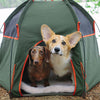Free Pet Rescue Near Me Location Tool
So, if you have a pet and are looking for a beautiful companion or your first pet, don't hesitate to adopt today and find an adoption center near you.
What should you do the first week with your newly adopted pet?
Just like us, pets need order and leadership. They seek order, which you must provide. Your pet needs to know that you are the friend and that you have a set of rules to live. Being friendly makes the transition from the shelter to your home more comfortable, faster, and more rewarding.
To help set order, hold a family meeting to create rules about caring for the dog. Purchase your essential pet care items such as ID tags, a collar, and a leash, food and water bowls, toys, home and bedding, and necessary grooming tools.
Just before you bring your new pet home, take it for a walk to tire out a little. For starters, when the new pet arrives at home, limit your pet to one room or area. Most mammals instinctively like to den, and a crate or cage makes the ideal place for your pet to sleep and get away from everything else.
Next is to plan a trip to the Veterinarian. You can read more about finding a Vet using our "Animal Hospital Locator." Your visit to an animal hospital will make sure your dog is healthy and will not transmit any diseases to other dogs. Welcome, Home Your Newly Adopted Friend.
To help set order, hold a family meeting to create rules about caring for the dog. Purchase your essential pet care items such as ID tags, a collar, and a leash, food and water bowls, toys, home and bedding, and necessary grooming tools.
Just before you bring your new pet home, take it for a walk to tire out a little. For starters, when the new pet arrives at home, limit your pet to one room or area. Most mammals instinctively like to den, and a crate or cage makes the ideal place for your pet to sleep and get away from everything else.
Next is to plan a trip to the Veterinarian. You can read more about finding a Vet using our "Animal Hospital Locator." Your visit to an animal hospital will make sure your dog is healthy and will not transmit any diseases to other dogs. Welcome, Home Your Newly Adopted Friend.
How do I introduce a puppy to an adult dog?
First, ensure your pets are up to date on all their vaccinations, including kennel cough. Treatment is especially important if the puppy is coming from a rescue kennel or shelter, or exposed to other animals. Just having the new puppy in the house will throw off your older dog, begin by keeping the puppy in an isolated location from the older dog.
As for the first introduction, choose a neutral and unfamiliar territory, such as a street or park you don't usually visit. For a very young puppy, start by having a friend holding the puppy in their arms and letting your friendly adult dog take a good sniff. Walks make future meetings an excellent bonding activity!
As for the first introduction, choose a neutral and unfamiliar territory, such as a street or park you don't usually visit. For a very young puppy, start by having a friend holding the puppy in their arms and letting your friendly adult dog take a good sniff. Walks make future meetings an excellent bonding activity!
What are some of the myths of animal rescue?
Did you know that most pets do not have a place to call home due to no fault of their own? It is a myth to think that all pets up for adoption in shelters and rescues in some way are no good. But nothing could be less accurate!
Dog shelters and rescues are full of active, lovable, and healthy adoptable pets just waiting for someone to take them home. The majority of pets given up when their prior owner can no longer afford the requirements. Or the owner didn't realize how much time & attention a pet deserves and needs.
Even worse, the number of pet adoptions in need compounded by a surplus of dogs bred for profit. Approximately four million adoptable pets are killed each year due to not being adopted. By taking home an animal from a rescue or a shelter, you are saving that pet. You are also making room so they can keep another pet from a shelter. As you can see, pet adoption is truly a continuous cycle of saving lives, and it's the humane thing to do! Please consider pet adoption, and please help debunk the myth of homeless pets in the future.
Dog shelters and rescues are full of active, lovable, and healthy adoptable pets just waiting for someone to take them home. The majority of pets given up when their prior owner can no longer afford the requirements. Or the owner didn't realize how much time & attention a pet deserves and needs.
Even worse, the number of pet adoptions in need compounded by a surplus of dogs bred for profit. Approximately four million adoptable pets are killed each year due to not being adopted. By taking home an animal from a rescue or a shelter, you are saving that pet. You are also making room so they can keep another pet from a shelter. As you can see, pet adoption is truly a continuous cycle of saving lives, and it's the humane thing to do! Please consider pet adoption, and please help debunk the myth of homeless pets in the future.
Do pet rescues come already trained for the home?
Even though living in animal rescue isn't ideal, most rescues are assisting the dogs in more ways than just keeping it alive. Dogs can be with other dogs that help make them kinder and playful with all types of animals. Many rescue organizations use foster homes, where puppies and kittens for adoption socialized with children and other dogs and cats. These cats and dogs are given essential obedience training before they go to their new home.
This makes the transition to your home much easier for both pet and owner. Another positive aspect of pet adoption to point out, many cats and dogs in animal shelters and humane societies trained, housebroken, and ready to go! The ready to go is on behalf of the hard-working shelter volunteers and foster caregivers some of the time. It is also possible the dog has already lived in a home and has gotten to know the household rules. These rules include using the bathroom outside, or not jumping onto furniture.
This makes the transition to your home much easier for both pet and owner. Another positive aspect of pet adoption to point out, many cats and dogs in animal shelters and humane societies trained, housebroken, and ready to go! The ready to go is on behalf of the hard-working shelter volunteers and foster caregivers some of the time. It is also possible the dog has already lived in a home and has gotten to know the household rules. These rules include using the bathroom outside, or not jumping onto furniture.
Are rescues, pros at matching you with the right pet adoption?
Shelter workers are conscientious about making sure their animal adoptions go well, and their pets end up in the best homes for animal and owner. Each organization has its pet adoption application and vetting process for potential adopters.
Since rescues spend so much time with their dogs, they can match you up with the perfect friend for you. Volunteers also follow up with you after the adoption to make sure everything's well. They can help you get through any rough spots by offering dog training tips and lots of other advice.
Adopting from a pet rescue group has another benefit. If, for some reason, things don't work out with your new dog, most rescues will take the animal back, saving you a lot of trouble. Each rescue has its animal adoption process for screening; this process designed to make sure you end up with the best pet for your family.
Many rescues even specialize in certain types of animals or small dogs; some rescue only giant breeds. There are also rescue groups devoted to a particular kind of dog or cat, too!
Since rescues spend so much time with their dogs, they can match you up with the perfect friend for you. Volunteers also follow up with you after the adoption to make sure everything's well. They can help you get through any rough spots by offering dog training tips and lots of other advice.
Adopting from a pet rescue group has another benefit. If, for some reason, things don't work out with your new dog, most rescues will take the animal back, saving you a lot of trouble. Each rescue has its animal adoption process for screening; this process designed to make sure you end up with the best pet for your family.
Many rescues even specialize in certain types of animals or small dogs; some rescue only giant breeds. There are also rescue groups devoted to a particular kind of dog or cat, too!
Will the rescues have plenty of purebred dogs for me to choose from?
If you have your heart set on a specific dog breed before you check out a breeder or pet store, why not at least look into dog adoption as an option? Twenty-five percent of all dogs in a shelter are purebred.
There are also lots of specific dog breed rescue groups that specialize in a particular breed of dog. Don't be fooled into thinking that animal shelters and dog rescues filled with dogs that discarded because they're "bad."
Shelter dogs for adoption are wonderful companions who became the victims of a family tragedy, divorce, or unlucky circumstances. Did you know that many backyard dog breeders and pet stores who supply the majority of purebreds are selling inbred pets without care for preventing genetic problems?
Mixed breed dogs have generally less inherited genetic disease, less inbreeding, and, therefore, overall lower veterinarian bills and happier dogs! The best place to find a mixed breed is at the rescue, SPCA, humane society or animal shelter.
There are also lots of specific dog breed rescue groups that specialize in a particular breed of dog. Don't be fooled into thinking that animal shelters and dog rescues filled with dogs that discarded because they're "bad."
Shelter dogs for adoption are wonderful companions who became the victims of a family tragedy, divorce, or unlucky circumstances. Did you know that many backyard dog breeders and pet stores who supply the majority of purebreds are selling inbred pets without care for preventing genetic problems?
Mixed breed dogs have generally less inherited genetic disease, less inbreeding, and, therefore, overall lower veterinarian bills and happier dogs! The best place to find a mixed breed is at the rescue, SPCA, humane society or animal shelter.
What benefits will pet adoption bring to my kids?
Pet adoption will build life lessons for kids of all ages. Pet adoption provides a resourceful opportunity to teach significant values to children. The decision to devote your resources and care to an animal in need sends an unmistakable message about the identity of a family's underlying values.
It is a great time to examine who you are as a family and what you stand for. It is through this process that a child learns things like, "We are a family with an important choice to make, and we are going to use the power of this choice to save a life."
This teaches kids about personal responsibility and their impact on the greater good as they make choices in life. Children need to feel they can impact their world. Choosing pet adoption can plant the seeds for that ethic. Pets help children get outside more, go for walks, run, and play – and enjoy all the associated health benefits.
Kids also learn responsibility by caring and feeding for a new animal's routine needs. Children with pets display improved control, social skills, and self-esteem. And for emerging readers, reading to a pet is an easy way to feel comfortable.
It is a great time to examine who you are as a family and what you stand for. It is through this process that a child learns things like, "We are a family with an important choice to make, and we are going to use the power of this choice to save a life."
This teaches kids about personal responsibility and their impact on the greater good as they make choices in life. Children need to feel they can impact their world. Choosing pet adoption can plant the seeds for that ethic. Pets help children get outside more, go for walks, run, and play – and enjoy all the associated health benefits.
Kids also learn responsibility by caring and feeding for a new animal's routine needs. Children with pets display improved control, social skills, and self-esteem. And for emerging readers, reading to a pet is an easy way to feel comfortable.
How do you plan for a pet-friendly schedule?
How much time your new pet adoption will need is dependent on the type of pet. This is including but not limited to the age, breed, amount of previous training, other pets & people in your home, and your current activity level and lifestyle. Matching the time a pet will take to the amount of participation you want to spend on your pet is a crucial part of finding your new best friend!
An excellent first step is thinking about your current routine. How much free time do you have each day that you are willing to devote to the care, training, and attention? For pets like birds, rabbits, dogs, and cats, time spent just "hanging out" with you while you're watching a movie or reading a book counts too!
Dogs and puppies vary the most in their time requirements. They are ranging from an adult, already-trained, mellow breed, to a high-energy puppy that would love a jogging companion and another high-energy dog friend. Be prepared to spend at least 4-5 hours a day with a high energy puppy who needs training, about 3-4 hours a day with a single adult dog.
An excellent first step is thinking about your current routine. How much free time do you have each day that you are willing to devote to the care, training, and attention? For pets like birds, rabbits, dogs, and cats, time spent just "hanging out" with you while you're watching a movie or reading a book counts too!
Dogs and puppies vary the most in their time requirements. They are ranging from an adult, already-trained, mellow breed, to a high-energy puppy that would love a jogging companion and another high-energy dog friend. Be prepared to spend at least 4-5 hours a day with a high energy puppy who needs training, about 3-4 hours a day with a single adult dog.
How do I prepare my budget for pet adoption?
Being an excellent, caring pet owner involves many things that don't affect your wallet, like your time and love. There are certainly costs to plan for with pet adoption. If you've never owned a particular type of pet before, knowing how much your new pet will cost can be complicated.
When adopting an animal at the shelter, there will usually be a dog adoption fee. The rescuer often pays to have the animals neutered or spayed if they aren't already. They will provide vaccines, and pays for all medical care needed while the pets are in their rescue.
Food, beds, leashes, collars, tags, grooming, are upfront costs, but luckily much of that cost is not passed on. Typical adoption fees range from $100 to $300. Next, consider your necessary supplies such as a collar, IDs, microchip, leash, pet bed, bowls, and toys.
The highest cost will be food, which depends on the size and type of dog you will be adopting. The shelter can provide you with what kind of food to feed the dog you want to select and the cost.
Other expenses are mostly medical and will include regular vet checkups, and the potential for a trip to the animal hospital because of an accident, or illness. If you are away from your dog all day long, you may want to look into doggie daycare or a dog walker.
When adopting an animal at the shelter, there will usually be a dog adoption fee. The rescuer often pays to have the animals neutered or spayed if they aren't already. They will provide vaccines, and pays for all medical care needed while the pets are in their rescue.
Food, beds, leashes, collars, tags, grooming, are upfront costs, but luckily much of that cost is not passed on. Typical adoption fees range from $100 to $300. Next, consider your necessary supplies such as a collar, IDs, microchip, leash, pet bed, bowls, and toys.
The highest cost will be food, which depends on the size and type of dog you will be adopting. The shelter can provide you with what kind of food to feed the dog you want to select and the cost.
Other expenses are mostly medical and will include regular vet checkups, and the potential for a trip to the animal hospital because of an accident, or illness. If you are away from your dog all day long, you may want to look into doggie daycare or a dog walker.
What should I expect and do at my veterinarian visits?
Taking your newly adopted pet to the Veterinarian and finding a good Animal Hospital should be your priority. This is especially true if you have other pets. It's a good idea to make sure your new animal is healthy and doesn't have any diseases or viruses.
The best way to find a veterinarian is by asking people you know. The animal shelter or rescue group where you got your dog may have a good recommendation for you. You can use our free "Animal Hospital Locator" tool if you are unfamiliar with your location.
For proper preventative care, your dog or cat should be examined by a veterinarian more than once a year. A typical vet checkup includes searching for fleas using a special flea comb. Taking your dog's temperature, and a physical examination which will consist of checking your dog's eyes, nose, mouth, ears, teeth, skin, legs, joints, and genitals, and lymph nodes and listen to the heart and lungs.
It will be standard for the Veterinarian to stress the importance of avoiding parasites and will suggest options for bug prevention and control.
The best way to find a veterinarian is by asking people you know. The animal shelter or rescue group where you got your dog may have a good recommendation for you. You can use our free "Animal Hospital Locator" tool if you are unfamiliar with your location.
For proper preventative care, your dog or cat should be examined by a veterinarian more than once a year. A typical vet checkup includes searching for fleas using a special flea comb. Taking your dog's temperature, and a physical examination which will consist of checking your dog's eyes, nose, mouth, ears, teeth, skin, legs, joints, and genitals, and lymph nodes and listen to the heart and lungs.
It will be standard for the Veterinarian to stress the importance of avoiding parasites and will suggest options for bug prevention and control.
 5 Star Customer Reviews
5 Star Customer Reviews FREE Shipping Over $39
FREE Shipping Over $39
 Exceptional Customer Care
Exceptional Customer Care



